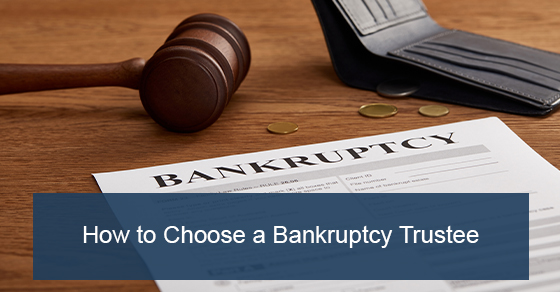If you’re considering filing for bankruptcy or for a consumer proposal, you will need the help of a bankruptcy trustee to guide you through the process. It is mandated by the government that a trustee help those looking for debt relief. As such, all bankruptcy trustees in Canada are licensed by the federal government.
What does that entail? Every trustee must have undergone extensive training, as well as practical experience to be granted a license. This is why bankruptcy trustees are now referred to as Licensed Insolvency Trustees.
While any trustee can help you file your case and they all follow the same set of laws, you’ll definitely want a trustee who understands your situation and with which you feel comfortable. Choosing the right trustee can be tricky and involve trial and error, but with the right professional to guide you, you can get the job done quicker and easier.
Here’s what you need to look out for when choosing your bankruptcy trustee:
What does a bankruptcy trustee do?
It is important to understand what exactly a trustee does for bankruptcy cases. A Licensed Insolvency Trustee will complete the paperwork with you and file it with the federal government. They are the only people who can do this. Their office will then become the point of contact between you and the creditors, and negotiate any dealings with them. In the situation of ending a secured debt with the creditor’s loss included in the case, secured assets are in some cases handed over to the trustee to be returned to the creditor.
How to Get Started
Before deciding on a bankruptcy trustee, set up an appointment to learn if they will be the right fit for you. Many firms will offer a free first consultation, which can be helpful when you’re still exploring your options.
Before your meeting, make sure to do some research about proposals and bankruptcy, so that you know what to be looking out for. Gather your documents and a rough summary of your financial situation so your potential trustee will know how to tackle your case. Also, ask questions to clarify any issues in order to get maximum value out of your consultation.
Key Factors to Look Out For
Your first meeting with your trustee is primarily to gauge if this professional is the right person to administer your bankruptcy or consumer proposal. This, of course, varies from person to person. It’s a great sign if you feel comfortable discussing and handling your financial matters with this person, as well as trust the advice they are giving you.
Here are some key issues to look out for when finalizing your decision:
1. Make sure they are licensed by the federal government: All bankruptcy trustees must be licensed by the federal government to work professionally. However, it is important to confirm that the professional you are referring to is a Licensed Insolvency Trustee and not an unlicensed professional, such as a debt consultant (who advertises information about personal bankruptcy). Also, be wary of middlemen companies, who will charge you fees to offer advice, and can ultimately only refer you to an actual trustee to carry out the bankruptcy filing for you.
2. Ensure that the trustee is responsive to your questions: Your trustee’s office must be quick to respond to your queries and follow up on appointments. This will ensure that they will help you when you need it, be available to answer any questions you may have, and solve problems that may come up through the process.
3. Make sure you feel comfortable with your trustee: This is essential, as your trustee must treat you with sensitivity and respect. It is an additional sign of competency if they are able to address all your concerns upfront, and display transparency in their dealings and solutions to you.
You Should Understand your Key Duties
When choosing a bankruptcy trustee, you should make sure you understand the list of tasks that you will have to do. This will usually include:
-
The required payment to be made each month to your bankruptcy trustee.
-
The income and expense reports that you must complete and send to the trustee each month.
-
Information on the two bankruptcy counselling sessions you are required to attend.
-
Information on the two tax returns that must be completed for the year of bankruptcy.
Transparency is extremely important while filing for a proposal or bankruptcy, so it’s a great sign if your trustee includes these during an information session.
What Happens After Filing
After you meet with a licensed trustee for a consultation, you should have the information to decide on whether this professional is the right fit for you or not. A lot of companies will do the consultation before you sign any paperwork. At Kevin Thatcher & Associates, we believe that you should know what you’re getting into and be absolutely certain you’re working with the right people for you, which is why we provide a consultation free of charge.
Once you decide to sign with a firm, the firms will also provide credit counselling sessions as a requirement of the process and to get you back on track after you file, so be sure to look out for that when deciding on a bankruptcy trustee. Trustees can provide you with additional resources, which will give you information on rebuilding your credit, getting a credit report and budgeting, and savings advice.
Contact Kevin Thatcher
There you have it: you’re all set up to choose a bankruptcy trustee that is right for you! Remember to do your research and get all your queries or concerns addressed by a licensed professional with years of experience.
To set up a consultation or meet with a bankruptcy trustee, call Kevin Thatcher & Associates at 1-888-702-9801 or contact us here.

